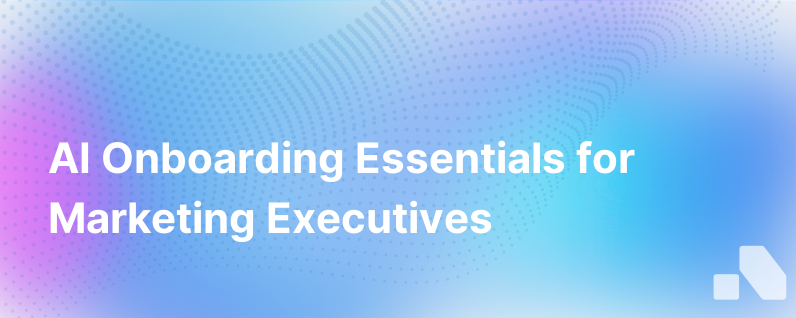
The advent of AI in the marketing world heralds a seismic shift in the way marketing departments operate. As personalized customer experiences become the norm, onboarding marketers in the age of AI and machine learning is no longer a matter of luxury—it is an imperative for survival and success.
AI for marketing onboarding refers to the process of introducing new marketers or marketing teams to AI tools, platforms, and strategies that leverage machine learning to analyze data, automate tasks, and make predictive decisions to enhance marketing efforts. It involves equipping marketers with the knowledge and skills necessary to utilize AI effectively.
In this exhaustive guide, we outline the strategic imperative of AI for marketing onboarding, explore methods to do it effectively, and examine the competitive edges it grants businesses.
Understanding the Imperative
The use of AI in marketing onboarding fulfills several critical functions:
-
Efficiency and Automation: AI helps automate repetitive tasks, allowing marketing teams to focus on strategic and creative endeavors. For instance, AI can handle campaign analytics, automate social media posts, or streamline email marketing efforts.
-
Data Analysis and Insights: AI processes vast quantities of data, offering real-time insights to marketers. These insights enable more informed decisions about buyer personas, customer journey mapping, and personalization strategies.
-
Predictive Analytics and Decision Making: AI leverages historical data to make predictions about customer behavior, campaign performance, or market trends, aiding in proactive rather than reactive marketing strategies.
-
Personalization at Scale: AI facilitates hyper-personalization of content and campaigns without requiring a linear increase in human effort, thus engaging customers more effectively.
Conducting AI Onboarding for Marketing Talent
The onboarding process should not only aim to familiarize marketers with AI tech but also to instill a mindset that embraces data-driven decision-making. Here's how companies can structure AI onboarding for marketing personnel:
Step 1: Foundational Knowledge
Start by building a foundation in data literacy and understanding of AI's role in marketing. Help new hires to:
- Understand basic concepts like machine learning, natural language processing, and predictive analytics.
- Recognize the different types of AI applications available and how they can be utilized in marketing.
- Identify the datasets that will be commonly engaged with and understand the importance of clean, structured data for AI effectiveness.
Step 2: Deep Dive into Tools and Platforms
Introduce the tools and platforms that the organization uses, which could include AI-powered solutions like:
- Customer Relationship Management (CRM) platforms with AI integrations.
- Content management systems (CMS) that use AI for content analysis and optimization.
- Programmatic advertising platforms driven by AI.
- Conversational AI tools for customer service automation, like chatbots.
Step 3: Practical Application
Foster practical engagement with AI tools through:
- Hands-on workshops and training sessions.
- Shadowing team members in AI-driven tasks.
- Assigning AI-driven projects with clear objectives and KPIs.
Step 4: Strategic Integration
Emphasize the role AI plays in broader marketing strategy, integrating onboarding with:
- Training sessions that demonstrate how AI intersects with the marketing funnel, customer journey, and overall user experience.
- Case studies showcasing successful AI marketing campaigns.
- Discussions around ethical considerations and best practices in AI applications.
Step 5: Continuing Education and Resources
Ensure ongoing learning opportunities and support are available:
- Access to AI marketing courses, certificates, and webinars.
- Inclusion in professional groups and forums dedicated to AI in marketing.
- Internal knowledge-sharing sessions.
Step 6: Cultural Shift
Ingrain a culture that welcomes AI by:
- Encouraging a trial-and-error approach where the use of AI is both supported and expected.
- Cultivating a culture where AI is seen as a collaborative tool rather than a threat to jobs.
- Fostering an environment of continuous feedback and adaptation to AI-driven insights.
The Competitive Edge Granted by AI Onboarding in Marketing
Businesses that successfully onboard their marketing teams with AI competency stand to gain on multiple fronts:
- They develop a strategic edge by being early adopters of a technology that will define the future of market interaction.
- They build brand loyalty and user experience by delivering personalized content and optimal customer experiences.
- They enjoy operational efficiency as AI manages routine tasks, freeing up creative capital for complex problem-solving.
- They gain insights on market trends and customer behaviors that are more granular and nuanced, thanks to the predictive power of AI.
Conclusion
AI for marketing onboarding is an intricate process that requires planning, strategic implementation, and support for ongoing learning. With consumers increasingly expecting personalized interactions and rapid service, companies must leverage AI to meet these demands or risk falling behind. The successful integration of AI within your marketing team can lead to improved campaign performance, enhanced customer understanding, and ultimately, a significant competitive advantage in an increasingly crowded marketplace.